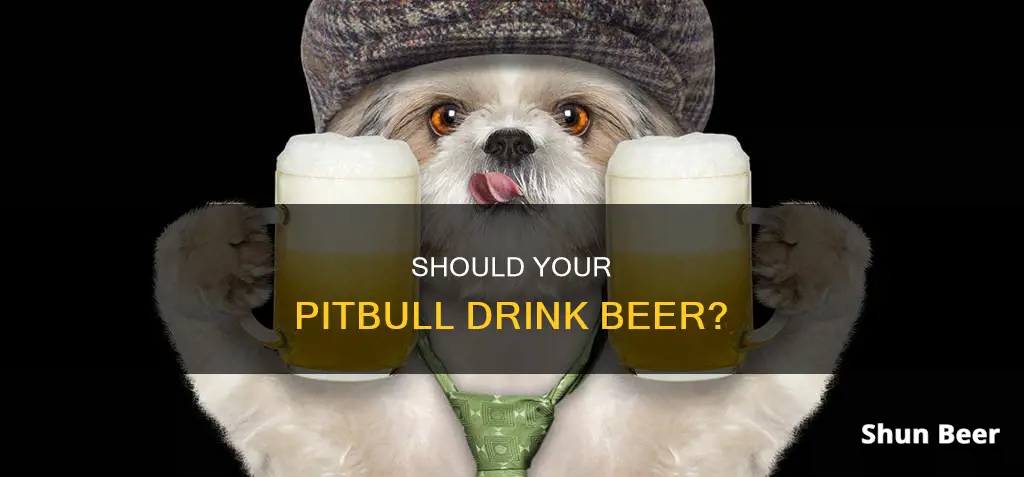
It is unsafe for dogs to consume beer or any other type of alcohol, as it can lead to alcohol poisoning and cause serious health issues. Even a small amount of beer can be harmful, especially to smaller breeds. Pitbulls, in particular, have been the subject of controversy when it comes to alcohol consumption, with reports of a woman forcing her pet pitbull to drink beer, sparking outrage among animal lovers. Therefore, it is crucial to keep alcoholic beverages out of reach and prevent accidental consumption by dogs.
| Characteristics | Values |
|---|---|
| Can Pitbulls drink beer? | No |
| Why? | Beer is toxic to dogs and can lead to alcohol poisoning |
| How much beer is too much? | Even a small amount or a lick of beer can be toxic to dogs |
| What happens if a dog drinks beer? | Dogs can experience lethargy, vomiting, poor coordination, diarrhoea, respiratory depression, hypothermia, seizures, and metabolic acidosis |
| What to do if your dog drinks beer? | Seek immediate veterinary assistance |
| Are there dog-friendly beers? | Yes, dog beers are made without alcohol, hops, and other components not suitable for dogs |
What You'll Learn

Why beer is toxic for dogs
As a responsible pit bull owner, you may be curious about whether it's safe to share a beer with your dog. The short answer is no—beer is toxic to dogs. Here's why:
Alcohol Poisoning
Beer contains ethanol, the intoxicating agent that gives you a buzz when you drink. However, it takes very little alcohol to cause poisoning in dogs. Even a few licks of beer can be enough to make a small dog appear drunk. Alcohol affects a dog's nervous system and can cause disorientation, lack of coordination, vomiting, lethargy, decreased breathing rate, low blood sugar, low body temperature, and low blood pressure. In severe cases, alcohol poisoning can lead to seizures, coma, or even death.
Hops Toxicity
Hops, a common ingredient in beer, are toxic to dogs and can cause elevated body temperature.
Carbonation and Bloat
Carbonated beverages like beer can increase the risk of bloat in some dog breeds.
Nutritional Concerns
Beer has low nutritional value and is high in calories, which can lead to health issues for your dog.
Xylitol Poisoning
While not a direct ingredient in beer, diet beer or beer mixers may contain xylitol, an artificial sweetener that is highly dangerous and potentially fatal to dogs.
In summary, beer is toxic to dogs due to the presence of ethanol and hops, as well as the potential for carbonation issues, nutritional concerns, and xylitol poisoning. It is important to keep your beer out of your dog's reach and never deliberately give them even a small amount. If your dog does accidentally ingest beer, contact your veterinarian immediately.
Beer and Diverticulitis: What's Safe to Drink?
You may want to see also

What to do if your dog drinks beer
If your dog drinks beer, it is important to seek veterinary advice immediately. While alcohol toxicity is not as common as you may think because dogs are not naturally drawn to alcoholic beverages, accidents can happen.
First, your vet will assess your dog's condition. You will be asked for details such as the type of beer/alcohol percentage, the quantity consumed, your dog's medical history, how long ago the beer intake happened, and what specific symptoms you observed.
Depending on the signs of alcohol toxicity shown, your vet will prioritize stabilizing your dog's condition. This might involve monitoring vital signs or providing oxygen therapy. As much alcohol as possible will be removed from your dog's system to enhance recovery. This can be done using intravenous (IV) fluids to support hydration and trigger the body to expel alcohol more effectively.
Under close observation, your vet will address any lingering alcohol toxicity signs and provide supportive care. This can include administering more fluids and nutritional supplements, and ensuring your dog is as comfortable as possible.
- Even a small lick of alcohol can be toxic to dogs.
- Alcohol intake can cause almost immediate symptoms in dogs and potentially contribute to longer-term health issues.
- Research has shown that alcohol can cause changes to the structure of a dog's brain and lead to cardiovascular concerns. In a worst-case scenario, alcohol consumption in dogs can be fatal.
- Dogs don't know what to expect and are affected quicker (within 30 minutes after intake).
- Signs of alcohol poisoning in dogs include mild staggering and incoordination, difficulty breathing, lethargy, vomiting, poor coordination, and diarrhea.
- Severe toxicity can result in respiratory depression, hypothermia, seizures, and an increase in acidity in the bloodstream (metabolic acidosis).
Viagra and Beer: A Safe Mix?
You may want to see also

How much beer is too much for a pitbull
It is important to note that even a small amount of beer can be toxic to dogs. Alcohol is toxic to dogs and can lead to alcohol poisoning. Therefore, it is advised that dogs should not be given any beer or alcoholic beverage.
The effects of alcohol on dogs are similar to those on humans, but dogs are affected much more quickly, usually within 30 minutes of consumption. The amount of alcohol and the weight of the dog are factors in how quickly alcohol poisoning can occur.
Signs of alcohol poisoning in dogs include:
- Mild staggering and incoordination
- Difficulty breathing
- Vomiting or retching
- Diarrhea
- Decreased respiratory rate
- Hypoglycemia (low blood sugar)
- Hypotension (low blood pressure)
- Hypothermia (low body temperature)
- Lethargy
- Poor coordination
If you suspect your dog has consumed any alcohol, it is important to seek immediate veterinary assistance. The vet may induce vomiting to help remove the alcohol from the dog's digestive system or provide oxygen therapy.
In summary, even a small amount of beer is too much for a pitbull or any dog. It is best to avoid giving your dog any beer or alcoholic beverage and to keep such drinks out of their reach.
Should You Drink That Beer Left Out Overnight?
You may want to see also

Signs and symptoms of alcohol toxicity in dogs
Alcohol toxicity is not very common in dogs as they are not naturally drawn to alcoholic beverages. However, it is important to note that even a little alcohol can cause alcohol poisoning in dogs, especially if the dog is small. If your dog accidentally consumes alcohol, it can be hard to know whether the amount consumed is at dangerous levels. Variables such as the health and weight of the dog, as well as the type and volume of alcohol consumed, need to be considered.
- Depression or lethargy
- Lack of coordination (ataxia)
- Vomiting or retching
- Decreased respiratory rate (breathing more slowly than usual)
- Hypoglycemia (low blood sugar)
- Hypotension (low blood pressure)
- Hypothermia (low body temperature)
- Excitement which changes to depression
- Difficulty breathing (dyspnea)
- Loss of consciousness
- Slow heart rate (brachycardia)
- Heart rhythm problems
If you suspect that your dog has consumed alcohol, it is important to contact your vet, emergency clinic, or Pet Poison Helpline to establish if treatment is needed. The impact of alcohol consumption on dogs is often mild, but it can sometimes be life-threatening.
The Magic Behind Beer Machines: A Brewing Revolution
You may want to see also

What to do if your dog shows symptoms of alcohol poisoning
While it may be tempting to share a beer with your four-legged friend, beer and other alcoholic drinks are toxic to dogs and can cause alcohol poisoning. If your dog is showing symptoms of alcohol poisoning, it is important to act quickly and seek veterinary advice immediately. Here is what you should do:
- Assess the situation: If you know your dog has ingested alcohol, take note of the type of alcohol and the amount consumed, if possible. Also, make a note of when the ingestion occurred and any symptoms you observe.
- Contact your veterinarian or an emergency veterinary clinic: Share the details you have gathered with the veterinarian, who will be able to advise on the best course of action. They may recommend bringing your dog in for an examination.
- Provide details to the veterinarian: If you take your dog to the vet, provide them with as much information as possible about the product your dog was exposed to, the amount ingested, and any symptoms you have observed. Bring any product packaging with you if you have it.
- Follow veterinary instructions: The vet will assess your dog's condition and determine the necessary treatment. This may include monitoring vital signs, providing oxygen therapy, administering intravenous (IV) fluids, and providing supportive care to enhance recovery.
- Prevent future incidents: To prevent future incidents of alcohol poisoning, keep all alcoholic beverages and products containing alcohol out of your dog's reach. Be cautious when having parties or gatherings with your dog around, and ensure your guests do not leave drinks unattended.
- Induce vomiting (under veterinary guidance only): Do not induce vomiting in your dog without first consulting a veterinarian or veterinary staff. They will guide you on how to safely induce vomiting to reduce the risk of aspiration pneumonia and chemical burns to the digestive system.
Remember, alcohol poisoning in dogs can be time-sensitive, so it is crucial to act quickly and seek professional help if you suspect your dog has ingested alcohol or is displaying any symptoms of alcohol toxicity.
Will Beer Affect Your Blood Test?
You may want to see also
Frequently asked questions
No, beer contains alcohol, which is toxic for dogs. Even a little beer can cause alcohol poisoning, especially if the dog is small.
Alcohol toxicity is not common, but accidents can happen. Dogs respond to the effects of alcohol much like humans, and the impact is often mild. However, you should contact your vet, emergency clinic, or Pet Poison Helpline if you have any concerns.
Key warning signs to look out for include depression or lethargy, lack of coordination, vomiting or retching, decreased respiratory rate, hypoglycemia, hypotension, and hypothermia.
If your pitbull accidentally consumes beer, contact your veterinarian immediately. Provide them with as much information as possible, including the amount and type of beer consumed, as well as any symptoms your dog is displaying.







